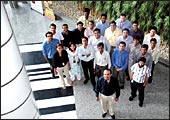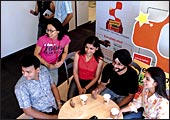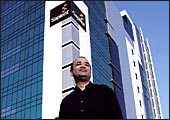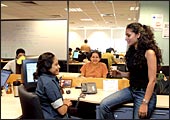 |
| It's all about people focus: Soomya
Banerjee believes in giving his employees an environment of
freedom |
On a Thursday
afternoon recently, a group of Sapient employees gathered for
a meeting at the conference room on the seventh floor of its office
at Cyber Greens, Gurgaon. Chocolate pastries, muffins, and cookies
were laid out on the table. The purpose: to discuss the venue
for a party planned that evening. A project had just been completed
and client satisfaction had surpassed expectations. Therefore,
the celebrations.
At Sapient India, the Indian arm of us-based business and technology
consultancy firm, the people focus is reflected in the company's
everyday work culture. "Sapient is a purpose-, vision- and
core value-driven organisation which facilitates the development
of a person's full potential," says Soumya Banerjee, Managing
Director, who joined the company 16 years ago at the entry level.
"We give our people an environment of freedom, flexibility
and trust, and this is what engenders loyalty," he adds.
SNAPSHOT
REVENUES*: $319.5
million or Rs 1,437 crore (2005)
PROFITS*: $25.7 million or Rs 115
crore |
Total employees: 2,000
Attrition (per cent): 18 per cent
Average career tenure: 2.69 years
Training budget (budgeted/actual): N.A./
Rs 2.39 crore
Training man-hours (actual): 127,039
Global figures |
"Our approach requires a high degree of cultural alignment
across teams, and thrives on strong values shared by colleagues
across the globe, transparency and a strong leadership,"
says Binoo Wadhwa, Director (People's Strategy), Sapient's nomenclature
for the human resource (HR) function. "We give individuals
lots of responsibility and freedom. This empowers them and provides
them with both the opportunity and the platform to grow,"
says Wadhwa. "The system allows you to give free reign to
your latent potential by bringing it out," says Sanjay Menon,
who heads Sapient's European Business in India.
The company emphasises the importance of teamwork and has a
system of providing feedback at every stage. "We look at
people's interests, what they are passionate about and then work
out how we can utilise it to unlock their potential," says
Banerjee.
Designations hold little meaning at Sapient; Associates (one
rank above trainees), who display potential and spunk, are often
entrusted the role of Project Managers. Says Sandeep Mahal, a
Senior Associate: "I felt I could handle the role of a project
manager, rather than just being a creative designer, and the company
helped me realise my goal." This also helps Sapient identify
future leaders.
 |
 |
| Purpose-, vision- and core value-driven
organisation: Yes, Sapient helps in facilitating the development
of a person's full potential |
The filtering process, in fact, starts at the recruitment stage
itself. "More than just domain skills, we assess whether
candidates possess the values that are core to Sapient and whether
this is exhibited in their behaviour," says Banerjee. The
process of integrating new recruits into Sapient also starts at
this stage. Once selected-and before they officially come on board-candidates
are given an overview of the company's businesses, and, in a nice
human touch, return home to find a bouquet of flowers from their
new-or rather, soon-to-be-employer waiting for them. "This
not only helps keep prospective employees well-informed, they
also feel involved with the company from Day Zero. Once they join,
employees have to undergo an induction programme that gives them
an understanding of Sapient's culture and their role within the
organisation," says Wadhwa. "Following the induction
process, new recruits are assigned a coach or a career manager,
who are, typically, top or senior managers. The role of these
mentors is to help them define career goals and chalk out a viable
growth path," he adds. The company has around 80 coaches
in India.
Sapient also employs a 360-degree performance appraisal system.
Employees are rated not only by their superiors, but also by their
peers and even subordinates. This cuts out, or at any rate minimises,
the possibility of bias or favouritism creeping into the process.
Result: an amazingly robust HR architecture. "And promotions
can happen anytime, even in six months, depending on performance,"
says Wadhwa.
INTERVIEW/SOUMYA
BANERJEE/ MD, SAPIENT
"Freedom, Flexibility, Trust Allow People
To Blossom" |
|
 The
man, who joined at the entry level 16 years ago and rose
to the top, spoke to BT's Amit
Mukherjee. Excerpts: The
man, who joined at the entry level 16 years ago and rose
to the top, spoke to BT's Amit
Mukherjee. Excerpts:
What makes Sapient one of the most sought after employers?
Sapient is a purpose- and value-driven organisation where
everyone is empowered to take decisions in line with our
culture. We provide a unique environment of freedom, flexibility
and trust that allows an individual's potential to flower;
this results in tremendous growth opportunities. Such a
culture, naturally, appeals to everyone.
What exactly do you mean by Sapient "culture"?
The entire culture is rooted in our overall strategic objective
and determines the work environment and prescribes the way
we interact with our clients, partners, and each other.
It ensures a high degree of alignment and cohesiveness across
and among teams, fosters the best global business ethics
and values, emphasises transparency and respect for each
other and brings out the latent leadership capabilities
of our colleagues. The culture enables our people to be
innovative, develop fulfilling careers and be incredibly
effective with their clients.
How do you choose your people?
In line with our culture, we look out for candidates who
have the potential to be successful. A person may not possess
the exact skills that are required for a particular assignment
but we try and figure out if he/she has the aptitude, attributes
and ability to pick up the skills and grow on the job. We
also look at a person's core values to ensure a cultural
fit.
Does a 360-degree appraisal really help?
Individuals are evaluated not only by their superiors,
but also by their colleagues and subordinates. They are
also expected to evalute themselves during the 360-degree
process; this gives them a great sense of responsibility
and empowerment which gets reflected in their output.
|
Further, the company takes pains to project itself as a caring
organisation. Soon after his marriage in 2004, Menon was on an
assignment in the UK, which had to be extended by a number of
days. "I was really surprised when my boss called to say
I should ask my wife to join me there at company expense,"
he says. "The company helps us strike a balance between our
professional and personal lives," adds Ritika Basu, Programme
Manager at Sapient.
 |
| Bonding with colleagues: There's work,
no doubt, but employees also take time out to catch up on
other things |
It also has a good reward system in place. Every quarter, the
company nominates individuals who have excelled in one or more
roles. The names of the winners and the nominees are prominently
displayed in the office corridors. Besides this, the company uses
stock options to reward employees. "The highest reward is
a trip to the Bahamas with your family," says Rakesh Krishna,
Senior Associate (Technology). "I think such awards are a
great motivating factor."
Despite its people-friendly practices and the high praise heaped
on it by employees, Sapient has a global attrition rate of about
18 per cent; the Indian figure is even higher (the company declined
to share the exact figure except to say it is lower than the industry
average of 30 per cent). But there are reasons for the company
to be worried. This year's figure marks an increase over last
year's attrition rate of 15.4 per cent. Industry sources say that
despite good HR policies, many companies are losing people because
they are being offered better pay packages elsewhere. "We
always talk to people who plan to quit and in many cases, manage
to work out a win-win solution," says Menon, who encounters
such problems within his team every once in a while.
Headhunters are also quite positive about Sapient. "It
is perceived as one of the more stable organisations with positive
growth prospects," says Arun Dasmahapatra, Managing Partner,
Heidrick & Struggles, an executive search firm. This ensures
a steady pipeline of talented recruits. But for the company to
hold on to its position as a preferred employer, it will have
to continue tweaking its HR policies to counter stiff competition
for talent from its bigger rivals," he adds.
A DAY
IN THE LIFE OF
RITIKA BASU, 31 Programme Manager |
 |
| It's one meeting after another: Yes,
most of Ritika's day is spent in the boardroom |
She clocks into office at
9.30 a.m. every day and immediately delves into her e-mail
inbox. There are queries from colleagues within the office
as well as from far-flung project sites across the globe.
It takes about half an hour for her to deal with all of
them. Thereafter, it's one meeting after another as she
updates herself on the status of various projects. On the
Friday when BT meets her, she has called a meeting at the
company's boardroom at 11.30 a.m. A client in The Netherlands
wanted an issue clarified ASAP, and Basu wants immediate
answers from the seven-member team working on it. Over the
next 45 minutes, she engages in a highly technical discussion,
interspersed with PowerPoint presentations projected on
a whiteboard, till a solution emerges. She looks relieved
as she rushes back to her workstation after making a call
to the client around 1:30 p.m. "Yes, it was a troubleshooting
session, but it's over!" she says.
Basu has been with Sapient for two years and plays a lead
role in the delivery function at the company. "The
job involves project design and management, quality control
and most importantly, ensuring that the team is happy and
motivated," she says. "At times, it can get quite
demanding and stressful but the flexibility and freedom
I get makes it satisfying," she adds. Basu sometimes
works out of home when personal commitments (such as her
three-year-old daughter Rianna) demand. "We get excellent
logistics support and so, can operate from almost anywhere,"
she explains. "Sometimes I start working after my daughter
goes to bed after 10:30 p.m.," she laughs over a sandwich
and coffee at a much-delayed lunch. It's more of the same
through rest of the day-back-to-back meetings to check the
status of various projects, interacting with clients and,
quite often, troubleshooting. Though she prefers and encourages
her teams to leave office early, her work sometimes stretches
on till late night, and she also often works from home.
"But I feel attached to the company, despite the long
hours, because of its operational transparency," she
signs off as she heads for her car.
|
|








 The
man, who joined at the entry level 16 years ago and rose
to the top, spoke to BT's
The
man, who joined at the entry level 16 years ago and rose
to the top, spoke to BT's 
